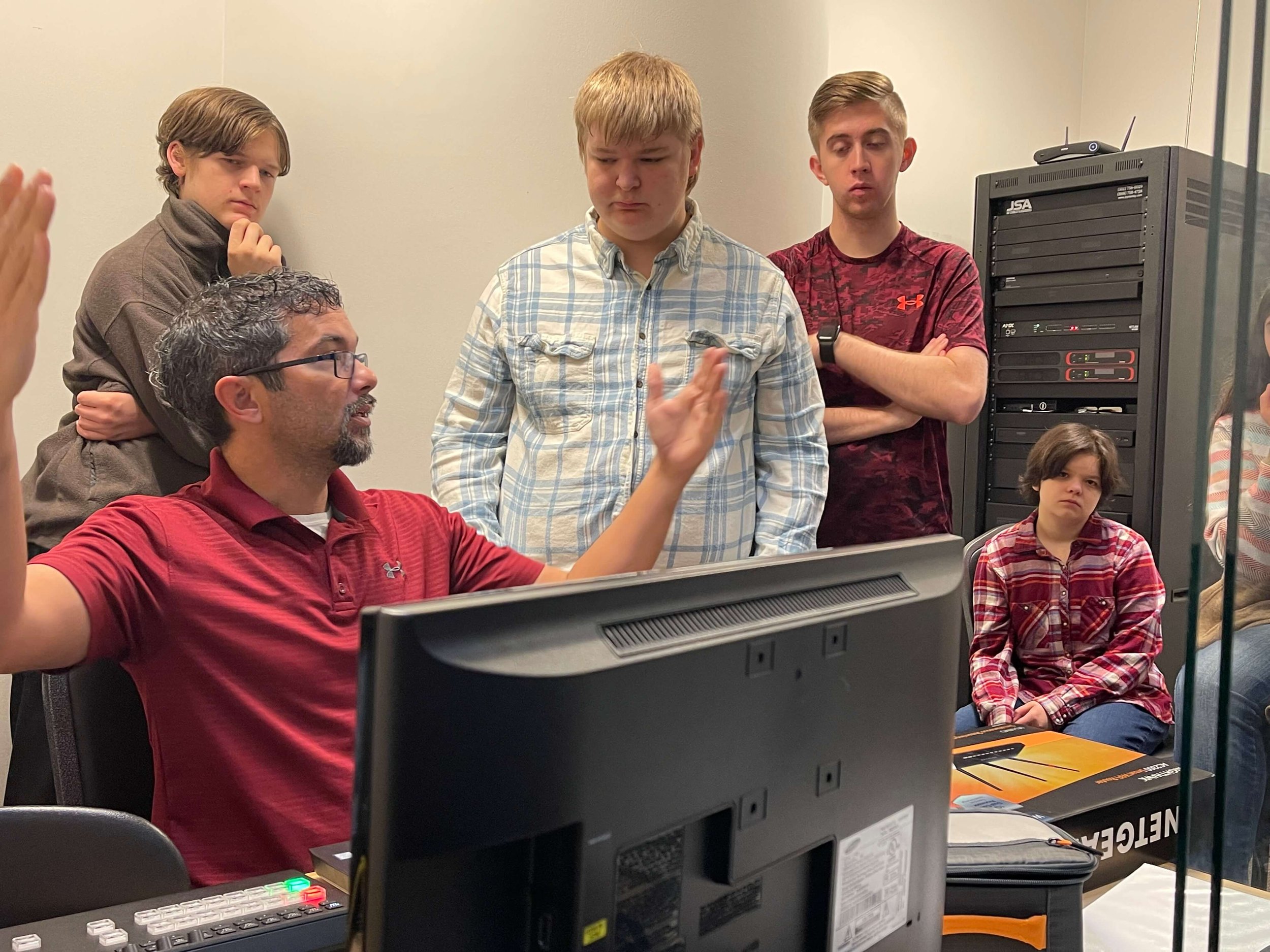By Rebekah Hall
U of A System Division of Agriculture
LITTLE ROCK — In an increasingly digital world, young people need to develop the technical skills necessary for success in many career paths. For students interested in video technology, the Arkansas 4-H Video Crew offers an opportunity for hands-on learning with industry professionals.
VIDEO SKILLS — Kerry Rodtnick, extension videographer for the University of Arkansas System Division of Agriculture, leads the Arkansas 4-H Video Crew, which provides training in video production for 4-H youth. The video crew conducts a multi-camera livestreamed broadcast of 4-H State O-Rama, the Teen Leader Conference, and other Division of Agriculture broadcasts. (Division of Agriculture photo.)
The Arkansas 4-H Video Crew recently announced 10 students from eight counties throughout the state as its members for the 2022-2023 school year. Kerry Rodtnick, extension videographer for the University of Arkansas System Division of Agriculture and leader of the 4-H Video Crew, said the program provides training that might not be available in students’ schools.
“The Arkansas 4-H Video Crew gives opportunities for 4-H students across the state to get their hands on equipment they might not otherwise have the chance to use,” he said. “The training they receive is on the level of a university experience. Most of the students tend to be homeschooled or come from smaller school districts that don’t have this kind of program.”
2022-2023 Arkansas 4-H Video Crew members:
Jack Berryhill: Hot Springs County
Kassidy Clark: Searcy County
Cade Cox: Washington County
Zach Gardner: Washington County
Connor Henry: Arkansas County
Sykes Lanthrip: Drew County
Josiah Lillard: White County
Elijah Victory: Perry County
Delaney White: White County
Ash Wood: Washington County
The group’s primary project is the multi-camera livestreamed broadcast of 4-H State O-Rama. This large annual event involves hundreds of 4-H members, county staff and volunteers, multiple state-level competitions, award ceremonies and more.
“The crew’s lessons start simple: setting up cameras, running and rolling cable, names and functions of equipment, and technique for operating a camera,” Rodtnick said. “As participants gain experience each year, we try to expand into interview techniques, editing, graphics and operating the switcher and livestreaming equipment. We intentionally use industry terms, so they are better prepared to immediately enter the job market.”
Rodtnick said Arkansas 4-H was one of the first states to livestream their state meeting, beginning in 2012 with a single camera. After realizing that “we could train 4-H students to produce the broadcasts with the same quality as hiring local professionals,” Rodtnick said the Cooperative Extension Service established the 4-H Video Crew in 2015 with seven students, and that many past members of the crew have stayed connected with the program, even coming back as mentors.
4-H participants interested in joining the video crew must apply each year, and Rodtnick said he contacts club leaders and county agents who know the students to help assess their abilities to work within a group and become leaders.
“The process is very selective, only accepting those who are passionate and willing to work hard,” he said.
Jack Berryhill, 17, said he’s excited to be a part of this year’s video crew and looks forward to working with his fellow members and Rodtnick.
“In a world with constantly advancing technology, any opportunity to learn skills in the technological field is an opportunity I will take,” Berryhill said. “I also strive to be involved in 4-H as much as possible. Anything I can be a part of is something I will try to go for.”
Lori Canada, extension 4-H STEM coordinator for the Division of Agriculture, said the 4-H Video Crew is a “great opportunity for 4-H youth to learn different aspects of video production” and that many previous crew members have gone on to work in the industry.
“This program gives youth the opportunity to see a new way of STEM implementation in today’s workforce,” Canada said.
In addition to the live O-Rama and Teen Leader Conference broadcasts, past crews have also helped with other Division of Agriculture broadcasts, created highlight videos from Arkansas 4-H events and helped with smaller county video productions. Video crew members participate in training sessions throughout the school year to prepare for these projects.
Rodtnick said the 4-H Video Crew benefits both its participants and Arkansas 4-H.
“Learning by doing is a hallmark of 4-H,” Rodtnick said. “Learning video production while providing a service to the 4-H organization only makes sense. The world is quickly turning toward video content production and communication through video and internet. Giving kids a knowledge of what professional content looks like gives them a head start over those who are ‘learning’ from social media producers who aren’t holding to clean, professional techniques.
“Crew members take this knowledge into their own lives and hopefully use these techniques for school presentations, future career opportunities and even one-on-one interpersonal relationships,” he said. “Coming from all over the state, these kids quickly learn how to work with others and find a bond that can extend well into their futures.”
Arkansas 4-H is a youth development program operated by the Cooperative Extension Service, part of the Division of Agriculture. The program teaches participants life skills through the “learn by doing” model. Program participants gain knowledge through non-formal, science-based, experiential education activities.
For more information about 4-H, contact your local county extension agent or visit 4h.uada.edu.
To learn about extension programs in Arkansas, contact your local Cooperative Extension Service agent or visit www.uaex.uada.edu. Follow us on Twitter and Instagram at @AR_Extension. To learn more about Division of Agriculture research, visit the Arkansas Agricultural Experiment Station website: https://aaes.uada.edu. Follow on Twitter at @ArkAgResearch. To learn more about the Division of Agriculture, visit https://uada.edu/. Follow us on Twitter at @AgInArk.

